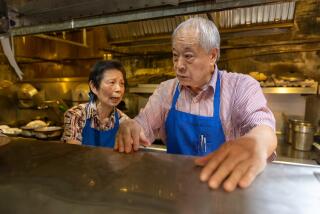Benson Fong, Character Actor and Founder of Cafes, Dies
Benson Fong, a character actor and founder of the well-known Ah Fong’s restaurants in the Los Angeles area, died Saturday.
Fong, a resident of Hollywood Hills, had suffered a stroke and later died at Cedars-Sinai Medical Center, according to his daughter, Lori Buoncristiani. She declined to reveal his age.
He is survived by his wife, Gloria, five children and three grandchildren.
Memorial services will be held at 11 a.m. Wednesday at Forest Lawn Memorial-Park, Hollywood Hills.
Fong was the son of a wealthy Sacramento merchant who went broke, became ill and died during the Depression of the 1930s. Fong told interviewers that, originally, he had no thoughts of becoming either an actor or a restaurateur.
His acting career in films and television, which lasted more than 30 years, resulted from a chance meeting with a Hollywood talent scout. After graduating from high school in Sacramento, and undertaking further studies in China, he returned to Sacramento and opened a grocery store with a cousin.
In 1943, while having dinner with some friends in Sacramento, he was approached by a man from Paramount Pictures, who asked if he would like to be in a movie.
Fong ended up with a role in a film called “China,” starring Loretta Young and Alan Ladd.
He was also offered a 10-week contract, for $250 a week.
“It looked like a tremendous fortune and I accepted quickly, afraid they might think twice and back out,” he told an interviewer. “I couldn’t read lines too well, but World War II was under way and all the studios were looking for actors with Oriental features. I bicycled around from one set to another, playing a Japanese here, a Filipino there, a Chinese on still other days.”
The next year, he played one of the sons in “Charlie Chan in the Secret Service.” Other films in which he appeared included “Thirty Seconds Over Tokyo” (1944); “Keys of the Kingdom” (1944); “His Majesty O’Keefe” (1954); “The Flower Drum Song” (1961); “Our Man Flint” (1965) and “The Strongest Man in the World” (1976).
His chain of five restaurants, which he built up over a 30-year period, resulted from a casual remark made by actor Gregory Peck. After appearing together in “Keys of the Kingdom,” Fong later recalled, Peck suggested they start a restaurant together.
“The idea appealed to me,” Fong said.
By that time, he had met his future wife, Gloria, who was working as an actress.
“We wanted to get married. But I wanted to have a predictable income, instead of becoming one more struggling actor. I decided it (the restaurant) would have to be done with my own capital, so I began saving.”
Two years later he had $11,000 and, in 1946, opened his first Ah Fong’s on Hollywood’s Vine Street.
By 1971, four others had opened--on Sunset Boulevard in Hollywood, in Beverly Hills, Encino and Anaheim. The Ah in the Ah Fong’s name is a term of respect in Chinese, he said. But actually, he said, he thought up the name while looking at the wrapper of an “Oh Henry!” candy bar.
Fong retired from the restaurant business two years ago. At the time of his death, only the Hollywood Ah Fong’s remained, owned by a relative.
An avid golfer and frequent traveler to the Orient, Fong practiced meditation and once described himself as “a split personality--half a pound Oriental and eight ounces Yankee.”
In one interview, he said he wanted to “sum up” his life this way: “Whatever I am, spiritually speaking, is what I’ve wanted to be, nothing more and nothing less. Call me a happy man and you call me by my rightful name.”
More to Read
Only good movies
Get the Indie Focus newsletter, Mark Olsen's weekly guide to the world of cinema.
You may occasionally receive promotional content from the Los Angeles Times.








